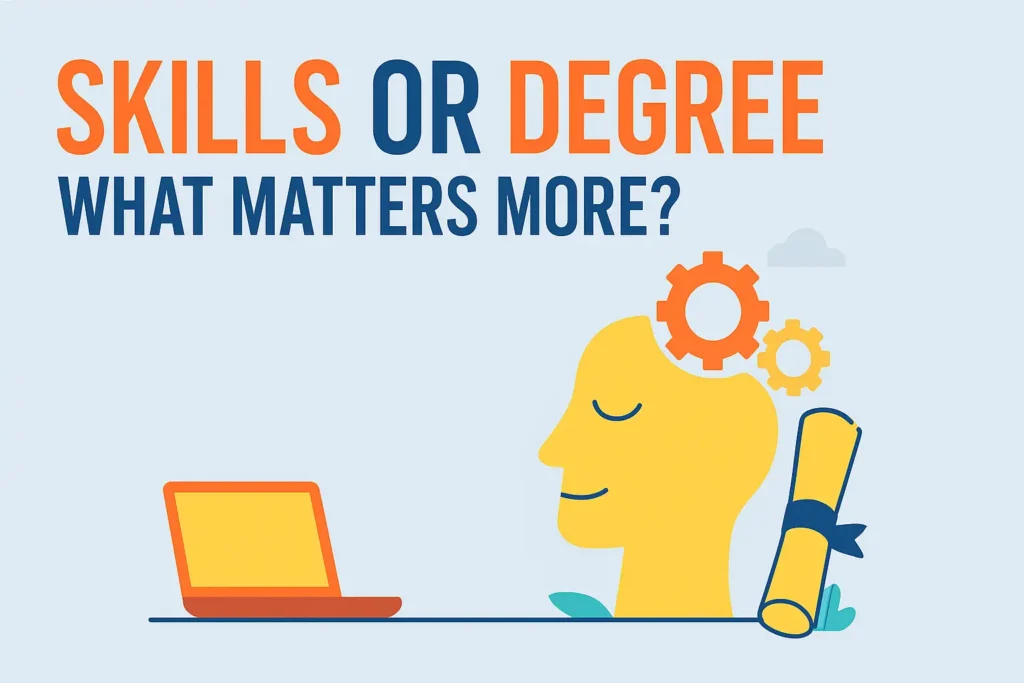
More and more companies now care about the skills people have or the value they can add to their projects, rather than the degree they have. So, the time when degrees had a significant value is near to over. Now, we can say the shift from degrees to skills is finally happening. But as a professional, it might worry you. But nothing to be scared of if you focus on the most demanding skills in the future.
Now, what skills to offer? Let’s find out.
Why Skills are Getting More Attention Than Degrees?
When you want to climb the ladder of success in professional settings, you need to keep working on your skills. But why is this shift being hyped in 2025?
- The AI Empowered Pivot
Today’s evaluation of hiring leaders is transforming; now, candidates are evaluated on the basis of skills first. They are relying less on traditional academic filters and more on real-world competencies.
Artificial Intelligence helps hiring managers map workforce skills, identify gaps, and predict which employees are likely to thrive in evolving roles.
It means:
- Real-world ability is now more valuable
- Hiring is becoming more performance-based and flexible
- Companies can now pivot their teams into new roles based on strengths.
- All this results in a faster and smarter way to develop high performance team and company.
- A Bigger And Broader Talent Pool
Removing degree requirements from job postings immediately expands the talent pool. Now, skilled workers who acquired their knowledge through boot camps, online courses, practical experience, or even self-study, also referred to as skilled through alternative routes, or STARs, can fairly compete for jobs that previously required a diploma.
This approach has its own benefits for future corporate cultures like:
- Better Candidate Pools
- Fast filling of Major Positions.
- Finding more passionate and productive employees.
Employers are becoming more aware of the fact that many talented individuals have non-traditional educational backgrounds, which is a strength.
- Degrees Are Losing Relevance
In industries like tech, marketing, design, and data science, things move quickly. Various tools and platforms light up every month, and keeping up means continuing learning and not a one-time course or degree.
Employers are getting more recognition for practical skills.
- Digital fluency
- AI literacy
- Critical thinking
- Creative problem solving
Degrees can still add value, but they’re becoming less relatable unless they’re paired with certification, real-world experience, or proof of recent learning. Those who keep them up to date are winning the rat race, regardless of their degree.
- Real-World Success Stories
Many top employers are already walking the talk by hiring based on skills. Major companies across tech, retail, logistics, and customer service are eliminating degree requirements, and their main focus is on what a candidate can demonstrate.
There are also increasing numbers of programs and alternative career pathways that prepare a person for some real roles, like offering internships, mentorship, and training without a loop of typical four-year education.
Skills-based hires turn out to be more loyal, perform better, and grow quicker within the right platform because they’re hired on the basis of what they can actually do instead of what they have only studied.
- The Impact of AI on Skills-Based Recruitment
Artificial intelligence is not only for something; it’s a whole big platform that is taking over certain positions, and it’s transforming how organizations organize their teams.
Modern workforce platforms have the capability to:
- Assess employees’ skill sets.
- Conforms with roles they may not have considered earlier.
- Suggest customising the upskilling chance for each employee.
AI is causing more chaos than humans used to do. Responsibilities such as sending emails, creating simple reports, or performing data examinations are now handled by AI. This shift means that applicants are expected to be ready from the outset—and employers are in search of discrete who can showcase their enthusiasm through projects, authentication, and practical experience.
Why This shift Is Good For Everyone
For Job seekers:
You don’t need a perfect degree to achieve a good job
There are better options available these days, offering more learning, which includes bootcamps, online skills through different courses
Focus more on developing high-level skills that are more preferable these days, including digital marketing, AI, coding, and cybersecurity
For employers:
Better, faster, and smarter hiring discussions
More diverse applicant pool
Companies that have their mindset settled with a skills-first mindset are usually looking for a more productive, faster, and stronger team
Challenges Still Exist:
Many companies still see a degree as a paper, not should not focus on grades in the studying era. We should build our skills first
There is also a risk of using too much AI in your work because some companies demand humanized text over machine-generated text.
Focusing on skills can be a lifesaver in your practical life.
Final thoughts:
Degrees are becoming less valuable if you don’t have skills. They remain crucial for certain professions such as healthcare, engineering, and law.
However, in numerous other sectors, what you are capable of doing is increasingly becoming more significant than your educational background.
Hiring based on skills emphasizes fairness and effectiveness. It creates opportunities for individuals who may have different learning styles, those who follow unconventional career paths, or those who cannot afford costly universities. This approach prioritizes abilities over mere qualifications.
As a job seeker, this is promising news. You have greater agency than ever to influence your career path. Concentrate on acquiring knowledge, gaining experience, and evolving.
As an employer, the most astute hires may be those who do not fit traditional criteria but have demonstrated their ability to achieve results.

